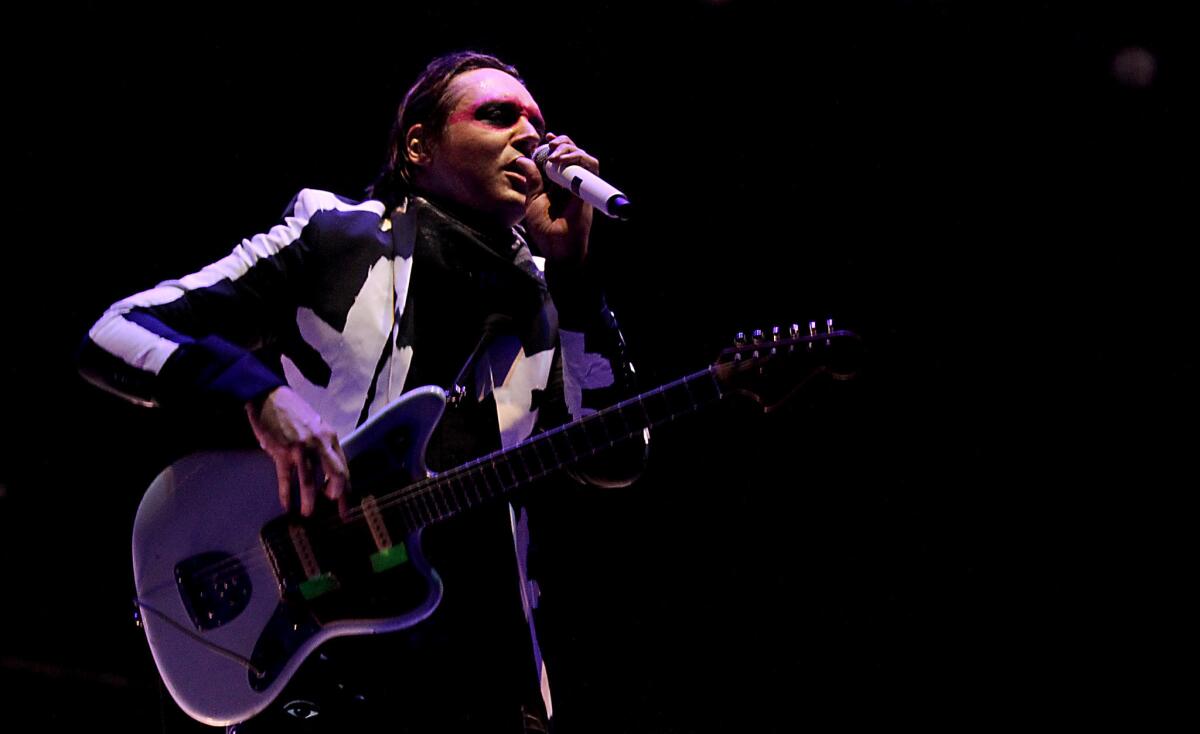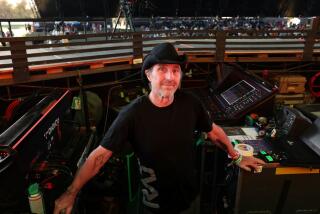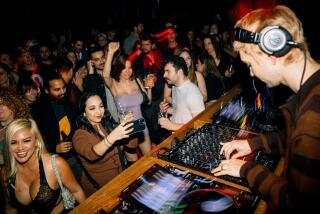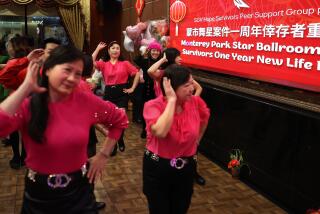Review: Arcade Fire revel, dance and rebel at the Forum

“This is a dance song,” Arcade Fire anchor Win Butler said Friday night as he introduced the single “We Exist” during the first of two nights at the Forum. He undersold it.
The song, a slinky little disco-influenced number, has more on its mind than shaking one’s tail. A little desperate, a little angry, “We Exist” is an anthem for LGBT rights, a message underscored by five cross-dressing dancers under a blue-tinged spotlight on a stage at the center of the Forum. Built around a predatory bass, one that reverberated through the close-to-full arena with cat-on-the-prowl determination, “We Exist” is a centerpiece of Arcade Fire’s recent groove-driven makeover.
When Arcade Fire released “Reflektor” about 10 months ago, the sprawling double-album revealed that the often celebratory Canadian group was as interested in following a beat as it was a riff. Coming a little more than two years after winning the Grammy for album of the year, “Reflektor” was supposed to be the album that cemented Arcade Fire as North America’s preeminent rock ‘n’ roll band.
Sometimes misunderstood – the album is full of tangents, Island rhythms and vaguely concealed political statements – “Reflektor” instead was an album that arrived as a challenge to the group’s fans as much as to the band itself. Now, deep into the “Reflektor” tour after headlining the Coachella Valley Music & Arts Festival last spring, Arcade Fire the arena act hasn’t abandoned “Reflektor’s” desire to confront.
If Arcade Fire didn’t redefine what it means to headline a basketball stadium, the band wisely and successfully dispensed with the self-congratulatory pomp and circumstance that often comes with the territory. Taking the stage before 9 p.m., well in advance of much of the late-arriving L.A. crowd, the band turned things over to a DJ (Pulp member Steve Mackey) by 11 p.m.
It was a move that seemed indicative of a band a tad uncomfortable with its superstar status, but the goal was to ensure that what happened in the crowd was sometimes as much of a show as what happened on the stage.
It was also evidence that as much as Arcade Fire may be pulling from dance and art rock -- check the abrupt stops and starts of “Joan of Arc” or the marbles-on-the-floor rhythms added by Haitian drummers Willonson ‘Tiwill’ Duprate and Jean-Romane ‘Diol’ Edmond to “Normal Person” -- that this large ensemble is still comprised of a bunch of rock ‘n’ roll insurgents at heart.
That an audience dance-off led by opener Dan Deacon at the outset was a highlight of the evening meant Arcade Fire largely pulled off its mission of converting the arena show into a communal gathering. “Get sassy,” Deacon ordered as he cheer-led a woman dressed as a wizard (Arcade Fire encouraged the crowd to come in costumes--less than half obliged) to do an interpretive dance to his shape-shifting orchestral electronic music. By the end of Deacon’s brief set he had commanded the entire arena floor to erupt in a mass high-fiving exercise.
It was the rare large-scale show that felt constantly in motion. At the core, that’s what the Arcade Fire of “Reflektor” represents. If some of the new songs lacked the hair-raising energy of older favorites such as “Rebellion (Lies),” they made up for it by juggling an array of genres and eras. “Afterlife” hinged on creaky, toy-like keyboards that weren’t quite Caribbean and weren’t exactly disco, while “Reflekor” referenced the score to “Blade Runner” amid a minimal white set that felt lifted from ‘60s French sci-fi film.
Hexagonal screens, which filmed the concert as if were a black-and-white movie, further distorted the sense of time and place. Attention at times shifted to a mirror-draped figure on the Forum’s floor, only to then find singer/multi-instrumentalist Régine Chassagne relocated to a satellite stage for “It’s Never Over (Oh Orpheus),” where a small army of backup dancers and camera filters created the illusion of peering into her skeleton. Close attention was needed to catch William Butler and Sarah Neufeld swapping strings and synths to accentuate the beat with rattlesnake shakes and a cavernous buzz.
Older songs were remade with a small horn section and a greater emphasis on the rhythm. “Haiti,” in particular, was well-suited for the new additions, as it became a trippy mix of carnivalesque synths and lost-in-the-space dub atmospheres. But the haunting imagery – the unmarked graves, the dead soldiers – telegraphed that Arcade Fire, even as Butler sported a sparkly gold sport coat and the group quoted the riff of Guns ‘N Roses’ “Welcome to the Jungle,” meant business.
That was clear on the encore take of new song “Here Comes the Night Time.” The festive Haitian drums and choral-reef-colored guitars created the sense of a party, but like the Clash’s “White Man in Hammersmith Palais” it presents the club as the last refuge for the outcasts. “If you’re the judge, then what is our crime?” Butler sang with more than a hint of bile, culminating a night that placed Arcade Fire at a rather unique crossroads: between revelry and rebellion.
Twitter: @Toddmartens
More to Read
The biggest entertainment stories
Get our big stories about Hollywood, film, television, music, arts, culture and more right in your inbox as soon as they publish.
You may occasionally receive promotional content from the Los Angeles Times.







